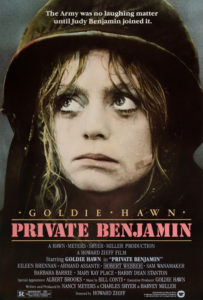|

Synopsis:
A young widow (Goldie Hawn) whose husband (Albert Brooks) died on their wedding night listens to advice from a military recruiter (Harry Dean Stanton) on the radio and decides to turn her life around by joining the army. After initial shock and some ribbing by a hard-driving commander (Eileen Brennan), Hawn becomes a dedicated, self-sufficient soldier — but when she meets a handsome doctor (Armand Assante), she must choose between love and a career.
|
|
Genres, Themes, Actors, and Directors:
- Albert Brooks Films
- Career-versus-Marriage
- Character Arc
- Comedy
- Feminism and Women’s Issues
- Goldie Hawn Films
- Harry Dean Stanton Films
- Military
- Strong Females
- Widows and Widowers
Response to Peary’s Review:
Peary writes that “in this popular comedy Goldie Hawn is at her most appealing as a Jewish princess from Philadelphia who… actually believes the [army] recruiter’s… promises of single rooms, yachts, [and] the easy life.” He notes that while she “gets more than she bargained for” during basic training, “the army also gets more than it bargained for”, and Hawn “becomes a good soldier” — at which point “the film becomes too conventional”. He writes that:
“Significantly, the army isn’t depicted as a character builder (as in An Officer and a Gentleman). Instead the fussy, childlike Judy, whose previous life had been completely orchestrated by men, evolves into a confident, strong, independent-minded woman in spite of the army, which is represented by less than noble characters: the recruiter who lies to her, the captain (Eileen Brennan) who tries to break her, the colonel (Robert Webber) who tries to rape her, the officer who will discharge her unless she breaks off with Assante. Judy may be sweet, gullible, and vulnerable, but… like all Hawn’s best characters, she has enough intelligence/shrewdness and perseverance to triumph over those in positions of power who try to take advantage of her and yank her in one wrong direction or another.”
Peary’s points about Hawn’s character are all true enough, but I wasn’t sufficiently invested in Hawn — someone whose self-professed life dream since the age of eight was “a big house, nice clothes, two closets, a live-in maid, and a professional man for a husband” — to care very much about her outcome. Sure, it’s great that she eventually moves past these childish dreams into something more realistic and self-proficient — but unlike, say, Working Girl (1988), this feels more like a feel-good message film (specific to a certain era) than an enduring classic.
Redeeming Qualities and Moments:
- Goldie Hawn as Judy Benjamin

Must See?
No, but Hawn fans will of course want to check it out.
Links:
|


2 thoughts on “Private Benjamin (1980)”
Agreed, not must-see – though Hawn fans will be pleased.
I saw this again in recent years and I agree with the observation that “this feels more like a feel-good message film (specific to a certain era) than an enduring classic.” Not that everything has to be a “classic” but, aside from being more of a popcorn flick, its appeal seems about as specific as its era.
I’ll also note Brennan (and esp. her comic timing) in her supporting role. I’ve always found her to be an intriguing presence – whether in comedy or drama.
A big, popular and critical hit in its day but one that has fallen by the wayside. I can’t recall the last time I saw it, or came across it being discussed, screened, revived etc.
I enjoyed it well enough at the time but not must see anymore, if it ever truly was.